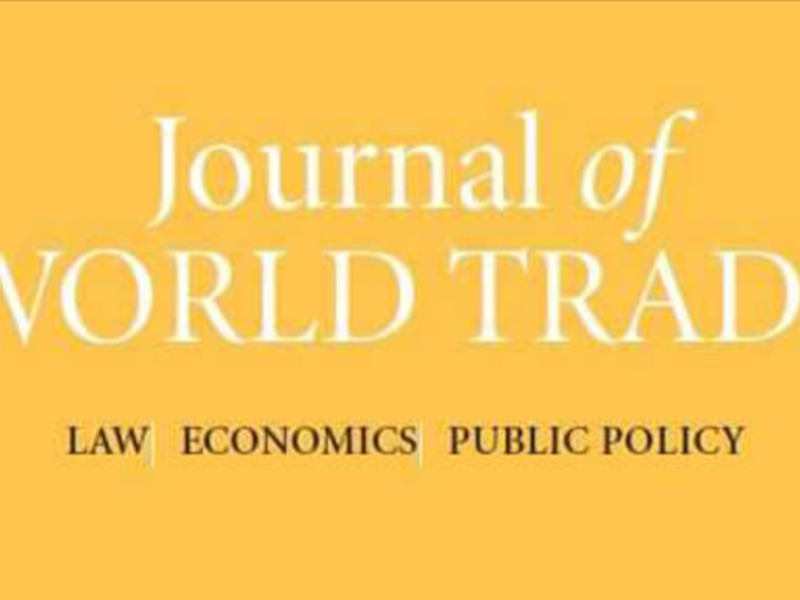Fresh Ideas Emerge for New EU Budget Levies

The Global Minimum Tax and Intra Western Tax Competition
This article offers a critical reassessment of the Global Minimum Tax, framing it not as a milestone of international unity but as a strategic instrument of intra-Western tax competition, particularly in light of President Trump’s recent executive order repudiating the U.S.’s prior support for the OECD’s global tax deal. It highlights how the Global Minimum Tax—once celebrated as a multilateral breakthrough—exposes underlying geopolitical tensions, with Western powers divided in their fiscal strategies and economic priorities. The analysis focuses on the European Union’s push for strategic autonomy and the United States’ internal gridlock and policy reversals, suggesting that the GMT reflects a fragmented and power-driven international order rather than a cohesive multilateral framework.

Trump Tariffs and Stock Prices
This article examines the impact of Trump-era tariffs and associated trade policy uncertainty on major U.S. stock indices using a structural vector autoregression model that accounts for global macroeconomic variables. The findings reveal that tariff shocks initially boost the S&P 500, Nasdaq Composite, and Dow Jones indices in the short run, but exert negative effects in the long run. Trade policy uncertainty, by contrast, has limited short-run impact but leads to a decline in stock prices over time. The combined influence of tariff and uncertainty shocks accounts for up to 35% of S&P 500 volatility, 20% for Nasdaq, and 54% for the Dow, underscoring the significant role of trade policy in driving market fluctuations. The paper concludes with policy recommendations to mitigate volatility and manage long-term investment risk in response to trade-related shocks.

The Impact of the US-China Trade War on Vietnam's Us Exports
This article investigates the spillover effects of the US-China trade war on third countries, using Vietnam’s exports to the U.S. as a case study. Analyzing highly detailed U.S. import data from 2017 to 2020, the study finds that although Vietnam’s overall exports rose by 8%, the average effect was statistically insignificant. However, Vietnam’s exports grew significantly in sectors where China had a pre-tariff war comparative advantage, suggesting Vietnam captured displaced Chinese trade. The paper also finds strong links between increased Vietnam-to-U.S. exports and rising China-to-Vietnam exports, as well as greater multinational corporation (MNC) activity, indicating tariff circumvention via supply chain reallocation. MNC activity is more closely associated with the extensive margin, reflecting new trade relationships rather than just expansion of existing ones. This article contributes to understanding how trade protectionism reshapes global value chains and redirects trade through third countries via strategic corporate responses.

Crystals and Mud in International Taxation: Why the Principal Purpose Test's Impact Will Not Meet Expectations
This Note reevaluates the Principal Purpose Test, a provision introduced into over 2,300 bilateral tax treaties since 2015 to combat treaty abuse and tax avoidance. The PPT allows countries to deny treaty benefits when it is reasonable to conclude that obtaining those benefits was a principal purpose of a taxpayer’s arrangement. While critics argue the rule is overly vague and grants excessive discretion to tax authorities, this Note contends that such concerns are overstated. It argues, first, that legal standards like the PPT tend to crystallize over time through administrative and judicial interpretation, becoming more predictable. Second, jurisdictional variation in enforcement — with some countries applying the PPT assertively and others, including tax havens, interpreting it narrowly — will moderate its global impact. The Note ultimately defends the PPT as a balanced and pragmatic reform: one that enhances accountability for tax avoidance without fundamentally disrupting existing international tax frameworks. Its true effect, it concludes, lies in the divergent enforcement choices of treaty-partner countries.

Transfer Pricing and Investment - How OECD Transfer Pricing Rules Affect Investment Decisions
This article analyzes how the OECD’s transfer pricing guidelines influence multinational corporations’ investment incentives by embedding different transfer pricing methods into a theoretical model of tax planning. The model shows that the investment effects of tax-motivated transfer pricing depend on how the transfer pricing method constrains firms. When the method focuses primarily on the transfer price, firms respond by increasing investment, as shifting profits through price adjustments becomes more attractive. However, when the method equally constrains profit shifting by both price and quantity, transfer pricing has no impact on investment at the intensive margin. The findings offer policy insights for designing transfer pricing rules that minimize distortions and suggest new empirical directions for studying how transfer pricing regulation shapes multinational investment behavior.

Weaponization of Trade Measures and Countermeasures
This article critically examines the growing trend of weaponizing trade measures, highlighting how the expansion of national security exceptions and the rise of unilateral trade sanctions have eroded the integrity of the multilateral trading system, particularly within and beyond the WTO framework. While recent WTO cases illustrate this problem, many similar instances fall outside formal oversight, amplifying the threat to global trade stability. The article assesses the systemic risks posed by this practice and argues that, without effective safeguards, the fragile international trade order may face further destabilization. To counter this trend, the article proposes seven concrete countermeasures aimed at restoring rule-based discipline and insulating trade from geopolitical manipulation.

Capital and Income Allocation in International Tax Planning and the Coordination of Joint Innovations among Subsidiaries of MNCs
This article investigates how multinational corporations’ capital allocation decisions influence the balance between tax planning and innovation coordination across subsidiaries. Using an analytical model, it shows that while both income shifting and capital deployment can enhance tax efficiency, they can undermine joint innovation efforts across borders. Contrary to standard expectations that lower tax rates boost investment, the model predicts that tax cuts on innovative income may actually reduce innovation-related capital investment in the country enacting the cut. Empirical analysis using patent-box regimes and a stacked-cohort design supports this prediction: MNC affiliates engaged in cross-border collaboration reduce innovative activity after a rate cut, particularly in more generous or restrictive regimes. The findings underscore a key policy tension: efforts to curb income shifting through preferential innovation tax regimes may discourage coordinated investment in innovation, revealing a complex tradeoff between limiting base erosion and fostering growth through R&D.

Modernising the Permanent Establishment Concept: Evaluating Its Relevance in a Changing Business Environment and the Sufficiency of Recent Amendments
This paper examines the continued viability of the permanent establishment (PE) concept—specifically the criterion of a fixed place of business in the face of structural changes to the global economy driven by digitalisation, remote service delivery, and short-term business activity. It explores how these developments, alongside interpretive challenges with dependent agent PEs, strain the traditional PE framework. The paper argues that recent updates in the Multilateral Instrument and the 2017 OECD Model Tax Convention function mainly as anti-avoidance tools rather than comprehensive solutions. These measures provide incremental reform but fall short of fully adapting the PE concept to address remote operations and digital business models, underscoring the need for more substantive modernization of the international tax nexus rules.

Making America Great Again? The Economic Impacts of Liberation Day Tariffs
This article assesses the long-term effects of President Trump’s April 2025 “Liberation Day” tariffs and finds that while unreciprocated tariffs could modestly benefit U.S. welfare by reducing the trade deficit and offsetting income taxes, reciprocal retaliation would generate significant welfare losses. The authors derive an optimal unilateral tariff of 19%, uniform across all partners and based on the overall trade deficit—not bilateral imbalances—highlighting a major design flaw in the USTR’s approach. If trading partners retaliate optimally, U.S. welfare could fall by up to 3.8%, and global employment could shrink by 1.1%.

Canada at Trade War
This article argues that Canada must adopt a bold and multifaceted strategy to counter the existential economic and geopolitical threat posed by a second Trump administration. Faced with U.S. protectionism, populist economic nationalism, and expansionist instincts, the piece calls for Canada to move beyond traditional retaliatory tariffs and WTO complaints. Instead, it proposes a resilience-centered approach that includes diversifying trade through initiatives like a new North Atlantic Free Trade Area or even unilateral liberalization; strengthening internal commerce and transportation infrastructure; and pursuing military modernization and urban renewal. The article further advocates for using Crown Corporations and unconventional monetary tools to stabilize investment and the Canadian dollar, while reinforcing the social safety net to maintain domestic cohesion in a turbulent global trade environment.


































